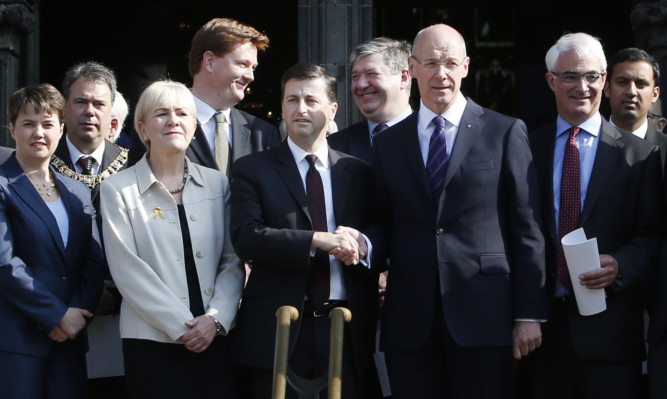The man in a dog collar shouting ‘turn away from sin’ was ignored by most of the Labour Party conference crowd in Manchester on Monday morning. Religion doesn’t usually have much to say to politics in Britain, or if it does it tends not to get heard.
But for a brief moment, in the wake of the referendum, the church stepped in to provide a vision of political harmony, and very welcome it was too.
At a service of reconciliation in St Giles in Edinburgh, the Moderator of the General Assembly of the Church of Scotland spoke of the need to promote healing and unity. After months of bitter feuding, pictures of leading Nationalists alongside leading Unionists made a startling impression.
SNP finance minister John Swinney shaking hands with Labour’s Douglas Alexander, flanked by Unionist hero Alistair Darling, the Scottish Tories’ Ruth Davidson and senior Lib Dems if not all friends then all people who were prepared to bury their differences or at least call a temporary truce. They presented a collective role model for the rest of Scotland on how to move beyond the divisions of the campaign.
Missing from this scene of Christian goodwill was Alex Salmond, who cannot let go of the struggle nor accept his defeat. His provocative counterpoint to his colleagues’ dtente was to threaten a separatist coup. Scotland could unilaterally declare independence without another referendum, he said on Sunday, barely two days after announcing his resignation as First Minister and leader of his party.
His behaviour, bizarre even by his standards, was a useful reminder of why he needs to go if Britain’s constitutional reforms, in all their complexity, are to have any chance of success. Whoever wins next May’s general election would not be able to do business with a politician with so little regard for democracy.
The personalities of our political elite have rarely mattered as much as they do now. It was largely the moderate and modest temperament of Darling that made Better Together possible, and kept partisan differences at bay, for as long as the campaign lasted.
Darling is unlikely to play a part in Holyrood politics but there are other key figures who, between them, may introduce a more consensual atmosphere as devolution moves into its next phase.
Swinney is one of them and already he has tried to tone down his boss’s outburst. Hopefully, the SNP will reflect more of his kind of good natured pragmatism and less of Salmond’s bully boy opportunism under its new leader, most probably Nicola Sturgeon.
Although we have a measure of her political skills we still don’t know what style of leader she will be. She wasn’t in that St Giles photograph, which is a pity, but perhaps she is waiting for Salmond’s departure, in November, before showing her true colours.
For Scotland’s sake, let’s hope she rises to the challenges. Thanks to her party’s majority, and its popularity the SNP could well win the 2016 Scottish election she will be the person spearheading this country’s rehabilitation after the damaging referendum.
She can follow her mentor’s example and alienate just about everyone, from the Governor of the Bank of England to the oil industry, from the medical establishment to big business. Or she can be a grown up.
She can throw hissy fits and ban selected members of the press from her briefings, like a tinpot dictator, and she can dodge serious questions about the country’s economy because the answers are not voter friendly. Or she can become a respected statesman.
The choice is hers but if she does distance herself from Salmond’s belligerence she will find her opposite numbers quite human, especially Ruth Davidson and the Scottish Lib Dem leader Willie Rennie. There is not much room for rapprochement with Johann Lamont but maybe Jim Murphy, another Unionist hero, will come to Scottish Labour’s rescue.
The Moderator John Chalmers said that now is a time to act with ‘magnanimity and graciousness to restore equilibrium’ and come together for a common good – the future of Scotland.
We don’t expect our politicians to agree on everything but we do ask them to be civil, to each other and to us, however we voted last week.
